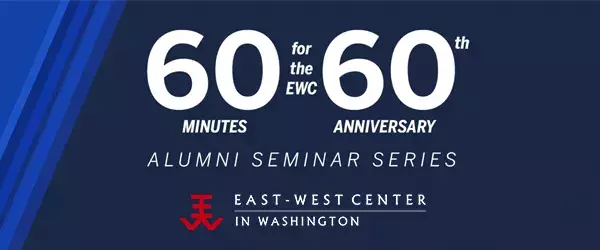Error message

OFFICE/DEPARTMENT
The East-West Center in Washington (EWCW) invites you to the
60 Minutes for the EWC 60th Anniversary Alumni Seminar Series:
When does China’s “Scaring the Monkeys” Strategy Work?
Featuring:
Dr. Ja Ian Chong (EWCW Asia Studies Visiting Fellow, 2012)
Associate Professor of Political Science, National University of Singapore &
2019-2020 Harvard-Yenching Institute Visiting Scholar
Dr. Satu P. Limaye (Moderator)
Vice President, East-West Center &
Director, East West Center in Washington
East-West Center in Washington · When Does China’s “Scaring the Monkeys” Strategy Work?
A common claim is that Beijing demonstrates deliberate and publicly visible coercive efforts toward particular targets to discourage other actors from challenging

its interests; sometimes described as a strategy to “kill chickens to scare monkeys.” This presentation examines when and to what degree states voluntarily comply with perceived PRC interests when they observe such punishment of a third-party. It contends that states more familiar with coercion from the PRC, often through recent experience of direct punishment, tend to be more resistant to accommodation, even given lobbying for compromise by domestic actors. The presentation considers two sets of paired comparisons—the United Kingdom and France after China’s sanctioning of Norway for Liu Xiaobo’s Nobel Peace Prize and Taiwan and Malaysia following China's alleged rare earth “export freeze” to Japan. The presentation sought to extend and apply this analysis to other states, particularly in Asia. It will also consider non-state actors such as corporations that observe peers like the NBA, various airlines, and various financial institutions getting punished for “hurting China’s feelings.”
This year marks the 60th anniversary of the East-West Center and its mission to promote better relations and understanding among the people and nations of the United States, Asia, and the Pacific through cooperative study, research, and dialogue. The East-West Center in Washington (EWCW)’s 60 Minutes for the EWC 60th Anniversary Alumni Seminar Series highlights the work of EWCW alumni/ae who have participated in our fellowship, publication, dialogue, and conference programs.
SPEAKER BIOGRAPHIES
Ja Ian Chong is associate professor of political science at the National University of Singapore and a 2019-2020 Harvard-Yenching Institute Visiting Scholar. He previously worked with the Centre for Strategic and International Studies in Washington, D.C. and the Institute of Defence and Strategic Studies, and was a Princeton-Harvard China and the World Program fellow. Dr. Chong’s work crosses international relations, comparative politics, and political sociology, and focuses on security issues in the Asia-Pacific. He follows the interplay of social movements, politics, and foreign policy in East Asia closely. Dr. Chong’s research received support from the East-West Center, Hong Kong Research Grants Council, National Bureau of Asian Research, Sasakawa Foundation, Singapore Ministry of Education, and Social Science Research Council. His work appears in a number of journals, edited volumes, and newspapers, including Asian Security, China Quarterly, European Journal of International Relations, International Security, and Security Studies.
Satu Limaye is Vice President of the East-West Center and the Director of the East-West Center in Washington where he created and now directs the Asia Matters for America initiative and is the founding editor of the Asia Pacific Bulletin. He is also a Senior Advisor at CNA Corp (Center for Naval Analyses) and Senior Fellow on Asia History and Policy at the Foreign Policy Institute at Paul H. Nitze School of International Studies (SAIS). He is a graduate of Georgetown University and received his doctorate from Oxford University (Magdalen College) where he was a George C. Marshall Scholar. Recent publications include: “America’s ‘Pacific Principle’ in an Indivisible Pacific Islands Region,” (Asia-Pacific Bulletin); “Despite Stumbles, America’s Engagement with Southeast Runs Deep,” (Global Asia); Raging Waters: China, India, Bangladesh, and Brahmaputra Water Politics (Marine Corps University Press); and Russia’s Peripheral Relevance to US-Indo Pacific Relations (Center for the National Interest).
The East-West Center in Washington (EWCW) invites you to the
60 Minutes for the EWC 60th Anniversary Alumni Seminar Series:
When does China’s “Scaring the Monkeys” Strategy Work?
Featuring:
Dr. Ja Ian Chong (EWCW Asia Studies Visiting Fellow, 2012)
Associate Professor of Political Science, National University of Singapore &
2019-2020 Harvard-Yenching Institute Visiting Scholar
Dr. Satu P. Limaye (Moderator)
Vice President, East-West Center &
Director, East West Center in Washington
East-West Center in Washington · When Does China’s “Scaring the Monkeys” Strategy Work?
A common claim is that Beijing demonstrates deliberate and publicly visible coercive efforts toward particular targets to discourage other actors from challenging

its interests; sometimes described as a strategy to “kill chickens to scare monkeys.” This presentation examines when and to what degree states voluntarily comply with perceived PRC interests when they observe such punishment of a third-party. It contends that states more familiar with coercion from the PRC, often through recent experience of direct punishment, tend to be more resistant to accommodation, even given lobbying for compromise by domestic actors. The presentation considers two sets of paired comparisons—the United Kingdom and France after China’s sanctioning of Norway for Liu Xiaobo’s Nobel Peace Prize and Taiwan and Malaysia following China's alleged rare earth “export freeze” to Japan. The presentation sought to extend and apply this analysis to other states, particularly in Asia. It will also consider non-state actors such as corporations that observe peers like the NBA, various airlines, and various financial institutions getting punished for “hurting China’s feelings.”
This year marks the 60th anniversary of the East-West Center and its mission to promote better relations and understanding among the people and nations of the United States, Asia, and the Pacific through cooperative study, research, and dialogue. The East-West Center in Washington (EWCW)’s 60 Minutes for the EWC 60th Anniversary Alumni Seminar Series highlights the work of EWCW alumni/ae who have participated in our fellowship, publication, dialogue, and conference programs.
SPEAKER BIOGRAPHIES
Ja Ian Chong is associate professor of political science at the National University of Singapore and a 2019-2020 Harvard-Yenching Institute Visiting Scholar. He previously worked with the Centre for Strategic and International Studies in Washington, D.C. and the Institute of Defence and Strategic Studies, and was a Princeton-Harvard China and the World Program fellow. Dr. Chong’s work crosses international relations, comparative politics, and political sociology, and focuses on security issues in the Asia-Pacific. He follows the interplay of social movements, politics, and foreign policy in East Asia closely. Dr. Chong’s research received support from the East-West Center, Hong Kong Research Grants Council, National Bureau of Asian Research, Sasakawa Foundation, Singapore Ministry of Education, and Social Science Research Council. His work appears in a number of journals, edited volumes, and newspapers, including Asian Security, China Quarterly, European Journal of International Relations, International Security, and Security Studies.
Satu Limaye is Vice President of the East-West Center and the Director of the East-West Center in Washington where he created and now directs the Asia Matters for America initiative and is the founding editor of the Asia Pacific Bulletin. He is also a Senior Advisor at CNA Corp (Center for Naval Analyses) and Senior Fellow on Asia History and Policy at the Foreign Policy Institute at Paul H. Nitze School of International Studies (SAIS). He is a graduate of Georgetown University and received his doctorate from Oxford University (Magdalen College) where he was a George C. Marshall Scholar. Recent publications include: “America’s ‘Pacific Principle’ in an Indivisible Pacific Islands Region,” (Asia-Pacific Bulletin); “Despite Stumbles, America’s Engagement with Southeast Runs Deep,” (Global Asia); Raging Waters: China, India, Bangladesh, and Brahmaputra Water Politics (Marine Corps University Press); and Russia’s Peripheral Relevance to US-Indo Pacific Relations (Center for the National Interest).








